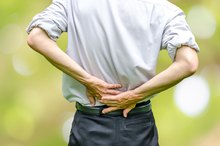How to Find the PC Muscle
Your PC muscle isn’t politically correct. Instead, PC stands for pubococcygeus. This muscle is sometimes known as the pelvic floor muscle because it supports your bladder, bowel and, for women, the uterus as well. The PC muscle is part of a group of muscles that may, confusingly, be referred to collectively as pelvic floor muscles: The bladder, sphincter muscles and PC muscle.
Strengthening your PC muscle with exercises known as Kegels, named after the developer, Dr. Arnold Kegel, benefits both women and men. But before you can strengthen your PC muscle you must find it, and train yourself to consciously control it.
Sit or stand at the toilet and urinate. Attempt to stop the flow of urine; this activates the PC muscle. You shouldn’t stop your urine mid-stream on a frequent basis, but it’s okay to try once or twice to locate your PC muscle.
Jelqing & Kegel Exercises
Learn More
Imagine that you’re trying to keep from breaking wind. This is another instinctive use of the PC muscle. Once you identify what it feels like to contract the PC muscle, you’ll be able to practice contracting it deliberately.
Insert the tip of one finger into your vagina, for women, or your anus for men or women. Practice squeezing your PC muscle, using either of the visualizations suggested above, until you feel a contraction around your finger. This confirms that you’ve located your PC muscle.
How to Prevent Premature Ejaculation During Sex
Learn More
Empty your bladder and sit or lie down. MayoClinic.com recommends perfecting your control of the PC muscle by contracting the muscle for five seconds at a time, working up to a total of four or five 10-second contractions, with 10 seconds of rest between each contraction. This is the most basic form of Kegels.
Tips
Kegels may be a helpful therapy component for women with persistent problems reaching orgasm, as published on MayoClinic.com. Other potential benefits from doing Kegels include preventing and reducing urinary continence in both genders and preventing pelvic organ prolapse. According to SexInfo Online, Kegel exercises may result in stronger erections, more powerful ejaculation and more intense orgasms for men.
Related Articles
References
- University of Maryland Medical Center: Kegel Exercises - Overview
- MayoClinic.com: Kegel Exercises: A How-to Guide for Women
- National Institute of Arthritis and Musculoskeletal and Skin Diseases. Basic facts about muscles. Updated July 2019.
- Biga LM, Dawson S, Harwell A, et al. Chapter 10. Muscle tissue, In: Anatomy & Physiology. XanEdu Publishing Inc; 1st edition; 2013:976-984
- The Myositis Foundation. Polymyositis
- The Myositis Foundation. Dermatomyositis
- Centers for Disease Control and Prevention. What is muscular dystrophy? Updated December 2, 2019
- Myasthenia Gravis Foundation of America, Inc. MG facts
- The ALS Foundation. What is ALS?
- Medline Plus. Rhabdomyolysis. Updated July 16, 2019
- American Heart Association. What is cardiomyopathy in adults? Updated March 31, 2016
- Finsterer J, Löscher WN, Wanschitz J2, et al. Secondary myopathy due to systemic diseases. Acta Neurol Scand. 2016;134(6):388-402. doi:10.1111/ane.12576
- Santilli V, Bernetti A, Mangone M, et al. Clinical definition of sarcopenia. Clin Cases Miner Bone Metab. 2014;11(3): 177–180. doi:10.11138/ccmbm/2014.11.3.177
- The IQVIA Institute for Human Data Science. Understanding neuromuscular disease Care. 2018.
- Brigham and Women’s Hospital. Electromyography
Writer Bio
Lisa Maloney is a travel and outdoors writer based in Anchorage, Alaska. She's written four outdoors and travel guidebooks, including the award-winning "Moon Alaska," and regularly contributes to local and national publications. She also has a background in personal training, with more than 6,000 hours of hands-on experience.









